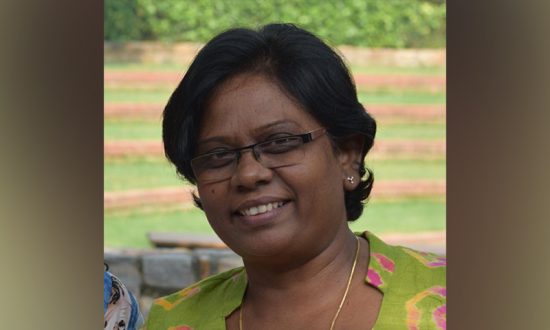Getzi Joel is a trained post-graduate in English, and comes from a small village in the district of Tuticorin, Tamil Nadu. She started her career as a teacher and after a few years, she shifted to social development work. Having found her passion in working with children and women she has been continuing in this field for more than 25 years. Currently she works with ActionAid Association in the Fundraising Unit. Getzi works on building donor engagement and communications. She has written several blogs.
When I was four years old, I lived in a small village. Every morning, I would visit the Government-aided school near my house. I would peep from a corner of the door or a window of the classroom. I admired the way the teacher taught children Tamil alphabets. She would hold the hand of each child, writing out alphabets on sand spread on the floor. I longed to step into the classroom, but admission to the school was possible only after completing five years of age. In those days, there were no pre-primary classes. So at the end of the forenoon class, at around noon, the teacher would give me a piece of jaggery through the window and send me home. Then, one day the teacher talked to my parents and allowed me entry to her class. It was exciting for me to sit with fellow children on the floor. I still remember the first touch of my teacher, helping my fingers write the alphabet on the sand. Even now, I choose the password question “Who is your first teacher?” and give her name as the answer.
My experience of childhood learning and education was blissful, but is this the experience of all children? Do all children have equal access to education? Millions of children are out of school. From school-going children, we hear stories of their challenges in commuting to school – crossing water bodies without bridges, walking through dense forest and rugged terrain, walking bare feet through traffic, busy highways and so on. Many a time, these challenges push children out of school.
These are children from vulnerable communities; their parents struggle to earn a full meal for the family. Only if education is free and children in school are fed would they send their wards to schools. In India, economic vulnerability is most often accompanied by social factors, and these families mainly belong to Scheduled Tribes, Scheduled Castes, and minority communities. In rural areas, they are landless labour, and in urban areas, they are workers in the informal sectors, as domestic workers, rickshaw pullers and street vendors.
The impact of the COVID-19 pandemic has seen children dropping out of school. Once out of school, children often end up in child labour or child marriage. Trafficking is another menace threatening these children. The pandemic has also exposed a massive gap in schooling as the new normal has imposed digital learning in a context where millions of students cannot access online education due to a lack of mobiles, computers, and Internet connectivity.
How can we make education and learning possible for all children?
With the enactment of the Right to Education Act in 2009, India has made education a fundamental right for children between six and fourteen years. But how meaningful is this Right? Have the Union and the State Governments adequately allocated the budget to provide quality education for all children? The Union Budget 2022 saw a reduced allocation for mid-day meals at schools. How can we encourage the families struggling for one meal to send their kids to school? Do we have the needed conditions and context for all children to access education? Making the right to education meaningful for all is a task that we must prioritise at all levels.
Creating a safe and enabling environment for children at all levels – family, school, transport – is the need of the hour. Vulnerable families, lacking basic needs like safe drinking water, health services, and stable income must be supported with access to nutritious food, health care, and better livelihood opportunities. The livelihood opportunities include land to the landless, housing, financial aid, and dignity in labour for all. Curbing gender discrimination at work with equal opportunities and equal pay is also essential. Unpaid care work, especially by women at home, complements other adults’ earning capacity and helps children access education. Government and policymakers cannot ignore the need to create an enabling environment for children.
Child education cannot happen in isolation. Due to the COVID-19 pandemic, children’s physical, emotional, and social well-being have been disrupted. Further, it has deprived them of their learning for more than two years. The priority now is that the Government, the public sector, civil society organisations, and the communities must support and work together to fix the above gaps. If not, we will be left with a weak generation and thereby a weak nation. At ActionAid Association, we are helping children access quality education and enjoy a happy childhood! Hands that help a child trace out the alphabet are hands that are making better futures for all!


